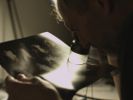Eye For Film >> Movies >> Anton Corbijn Inside Out (2012) Film Review
Anton Corbijn: Inside Out is an example of my favourite kind of documentary - a masterfully chosen subject, about which I am almost entirely ignorant, examined in rich detail. In this case, it's a detailed portrait of film director and photographer Anton Corbijn, who directed the masterful Control, and the understated The American.
The film follows Corbijn over three years, from 2008 to 2010, Klaartje Quirijns has been granted ready access to Corbijn, and we follow him over his work, exhibitions, family life and a short holiday to relocate his creative mojo. No moment is too simple for him not to speak his mind; the film opens with him lying on his couch (he is emphatic that it's not a psychiatrist's couch!), memorabilia surrounding him, and he speaks frequently, during train journeys, in scouting locations for a shoot and as he travels over the world during his promotional tours.

In following the man, Quirjins roughly and skilfully breaks down his subject, his humble beginnings as the son of a preacher Outsider - son of a Dutch Reformed Church preacher. He shares a small rhyme about why others ostracised him. (It sounds better in Dutch!) Corbijn is often isolated and alone in frame. We see him repeatedly returning to solitude, a nomad-with-a-suitcase's existence.
We return rhythmically to various chapters in his life. It's a wise strategy, peeling away layers of interesting discussion - each part elevating the others. One such chapter is that of his life growing up with his parents; it's candid. His father, the preacher "carried the weight of the world on his shoulders". We see his sister unravelling an album of family portraits. She's visibly emotional. "You can feel everything again when you see pictures? Isn't that beautiful?"
Corbijn is an enigmatic subject, although perpetually chatty; he speaks eloquently about his work, if not directly about his deeper motivations. Photography is "recording a piece of the world and bringing it back to your world". He began his careeer taking pictures of musicians - "that's the only thing I was ever interested in". Music's passion speaks deeply - "What music gives you is [the feeling] that you're not the only person who feels like that".
It's still clearly important to him, when he speaks lucidly about that which brought him to the subject of his first feature - Control. Excerpts from the film litter his comments, directly illustrating their potency with his passionate discussion. It's masterly editing. He's drawn to the "pain of creation", where artists "torture themselves for a long time to arrive at words and music."
"God, I really hate digital - you can never see what you're doing!". He shuns digital photography, gathering his early tests using a Polaroid camera. They deliver beautiful results - masterpieces of rich grain-soaked grayscale. That said, he's not averse to Photoshop. He supervises the digital manipulation of his Metallica portfolio, studying the retouched prints through an eyepiece.
His subjects praise his ability to capture "this composite world that doesn't really exist". The work unlocks the same spirit of creation that their subjects hope they really have. Their comments explain the photo's affirming power - they make them feel "you have what it takes to be a man"; or more directly "he can make anyone look cool!"
Following Corbijn during pre-production and production on The American is oddly compelling - we see him distil a location's visual impact, and boil down the action beats of a scene, speaking in hundred mile an hour Dutch, in the way that watching a master doing that which he does best is. "It's hard to explain [...] it comes naturally to me"
"Ugly things catch your eye and annoy you" - on arriving in a new hotel room, he immediately starts rearranging the furniture. He knows it's weird - "I know I am from Holland but..."
Even his hotel room view shots are extraordinary, beautifully composed, colourful and perfectly capturing a different look and mood throughout. Every time the film brings out a selection of his photographs, I found myself leaning forward - drinking in their beautiful details.
It's widely said about brilliant actors, that one could be entirely content watching them read from the phone book. After this dense film, I have no doubt Corbijn could take infinitely many fascinating pictures of aforementioned phone book.
Reviewed on: 27 Jun 2012


















